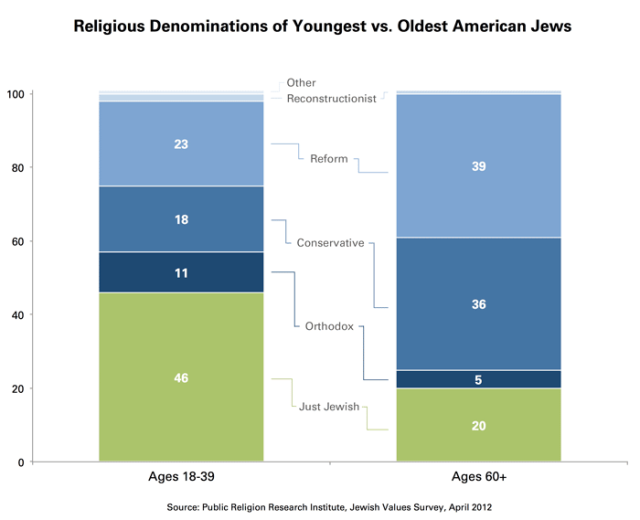Two percent of all Americans identify as Jewish, but not all six and a half million American Jews see their religious identity the same. Large generational divides exist on Jewish identity, religious service attendance, and the importance of being Jewish.
(1) Younger Jews are twice as likely than older Jews to not identify with a specific denomination. The largest disparity between younger (age 18-39) and older (age 60+) American Jews is not which branch of Judaism they identify with, but whether they identify with one at all. Forty-six percent of younger Jews describe themselves as “just Jewish,” rather than identifying with a specific denomination such as Orthodox, Reform, or Conservative. These younger Jews are far more likely to use the “just Jewish” label than their older counterparts; only 20 percent of older Jews say they don’t associate with a particular denomination, a 26 percentage point gap.
(2) Younger Jews don’t attend religious services as often as older Jews. In addition to their denominational identities, younger and older American Jews also differ in their religious practices. Besides weddings and funerals, 39 percent of younger Jews say they never attend religious services, compared to 22 percent of older Jews, a difference of 17 percentage points. Jews in general are not very likely to attend religious services, though; nearly half (47 percent) report they seldom (21 percent) or never (26 percent) do so. Younger Jews are also half as likely to report that they are members of synagogues or temples (20 percent) than their elders at 40 percent.
(3) The “importance of being Jewish” doesn’t resonate with younger Jews. Do you sense a theme? Younger Jews tend to be less “religious” overall than older Jews, so it shouldn’t be too surprising that they see Judaism as less important in their lives than their older counterparts do. Twenty-nine percent of younger Jews say being Jewish is the most important thing or very important in their lives, compared to 52 percent of older Jews.
All data taken from the 2012 Jewish Values Survey.
